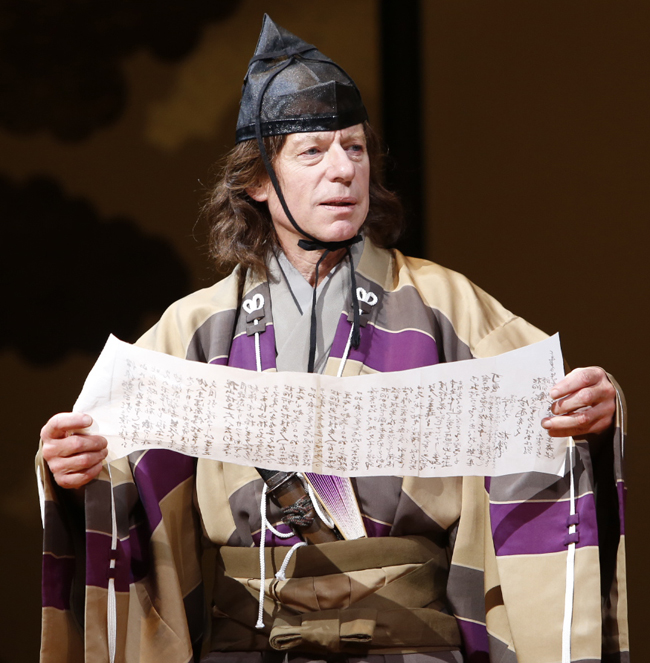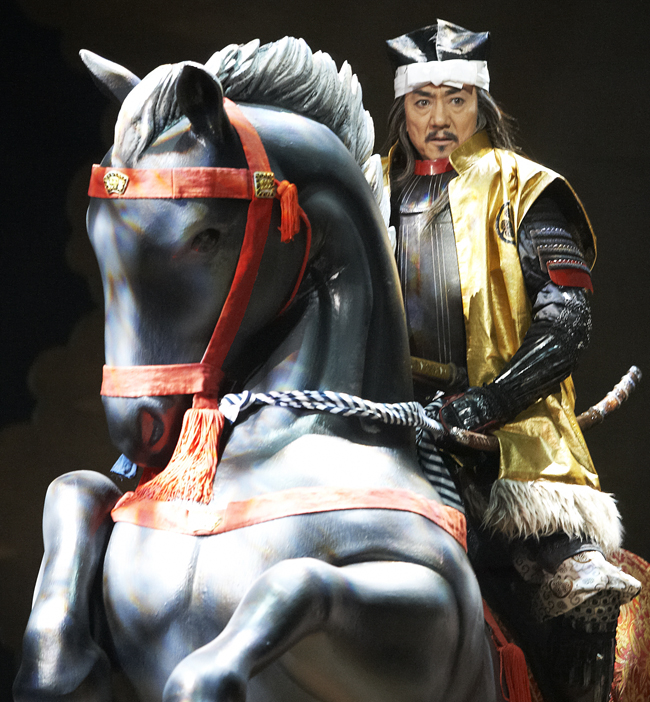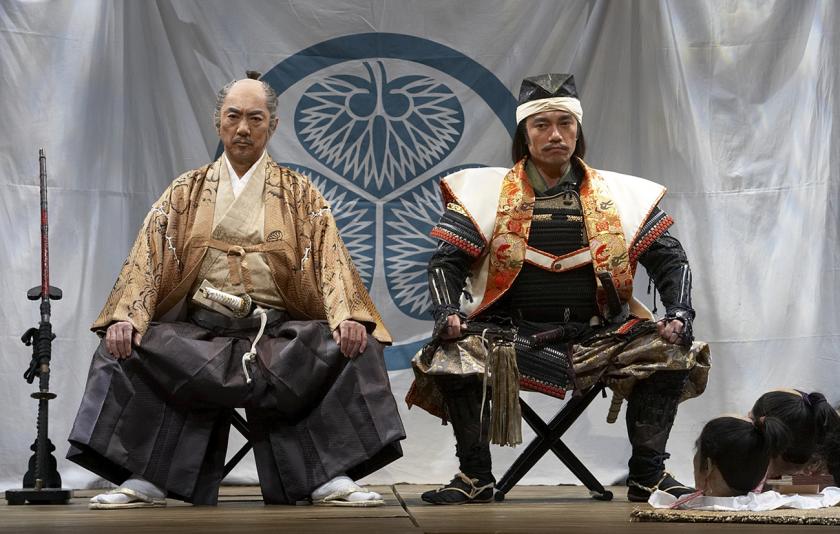There is never a dull moment in this three-hour historical epic, even if it is not always clear what is going on. Directed by Gregory Doran, of the RSC, Anjin follows the 17th-century story of William Adams, the first Englishman to land in Japan. The production has lines in English and Japanese, with surtitles above the stage and on either side, but it is sometimes difficult to read the words and watch the characters, especially for audience members in the middle of the stalls. This is not a fatal flaw – a well-plotted narrative and bold staging help the unenlightened follow the gist – but it is a challenge.
Doran has worked with writer Mike Poulton on this production. The pair were behind The Canterbury Tales for the RSC and a Japanese translation of The Merchant of Venice, and Anjin fits in well with both. It is also a tale of journeys and prejudice. Like Shakespeare's histories, it is driven by politics. Adams arrived in Japan just months before the Battle of Sekigahara in October 1600 (the battle brought in a Shogun who unified Japan), and Poulton and co-writer Shoichiro Kawai convey the tense climate. Sword fights and samurai presenting army leaders with the enemy's severed heads certainly liven things up, whoever the characters might be.
 The relationships Adams forms in Japan are more interesting. He ingratiates himself with the Shogun, Ieyasu Tokugawa, by sharing tales of his travels, and learns Japanese customs. Ieyasu changes the Englishman's name to Anjin (Stephen Boxer, pictured right) and makes him a samurai (he is the first foreigner to gain this rank). Adams, a Protestant, also develops a close friendship with Domenico, a Japanese Jesuit, who tries to save his soul. With their internal conflicts, these characters are fascinating. Adams feels he has one foot on land (he has a wife and daughter in London) and one foot in the ocean (he loves life at sea). Ieyasu dreams of travel, but has never left Japan. And as a priest, Domenico must remain submissive, but gets over-excited by battles.
The relationships Adams forms in Japan are more interesting. He ingratiates himself with the Shogun, Ieyasu Tokugawa, by sharing tales of his travels, and learns Japanese customs. Ieyasu changes the Englishman's name to Anjin (Stephen Boxer, pictured right) and makes him a samurai (he is the first foreigner to gain this rank). Adams, a Protestant, also develops a close friendship with Domenico, a Japanese Jesuit, who tries to save his soul. With their internal conflicts, these characters are fascinating. Adams feels he has one foot on land (he has a wife and daughter in London) and one foot in the ocean (he loves life at sea). Ieyasu dreams of travel, but has never left Japan. And as a priest, Domenico must remain submissive, but gets over-excited by battles.
Yuki Furukawa is particularly convincing as the well-intentioned Domenico, and Stephen Boxer, an RSC actor, plays William Adams with enthusiasm. Masachika Ichimura, one of Japan's leading actors, is an expressive Shogun. Of the supporting cast, the children are professional and adorable, while Yoshiko Tokoshima stands out for her impassioned performance as Yododono, a leader's widow intent on disrupting the peace. Doran's production hints at a lavish design, but the results are inconsistent. Yuichiro Kanai's sets are a mishmash of styles: video projections of a night sky and a fire; cut-outs of a boat and blossom; and traditional Japanese screens painted with cranes. The costumes, designed by Lily Komine, are also a peculiar mix. Some kimonos are beautiful, but the Japanese warriors wear hats for battle that look like they have been taken from a dressing-up box - Viking-like helmets with gold horns, a shiny hat with black antlers, and another with feathers sticking out of the top. Post-War Horse, the plastic-looking horse (pictured above) that appears during fights looks sorry for itself. Dozan Fujiwara's sweeping music, with its dreamy Japanese flutes, is a highlight, although the production would benefit from a live score and more choreography.
Doran's production hints at a lavish design, but the results are inconsistent. Yuichiro Kanai's sets are a mishmash of styles: video projections of a night sky and a fire; cut-outs of a boat and blossom; and traditional Japanese screens painted with cranes. The costumes, designed by Lily Komine, are also a peculiar mix. Some kimonos are beautiful, but the Japanese warriors wear hats for battle that look like they have been taken from a dressing-up box - Viking-like helmets with gold horns, a shiny hat with black antlers, and another with feathers sticking out of the top. Post-War Horse, the plastic-looking horse (pictured above) that appears during fights looks sorry for itself. Dozan Fujiwara's sweeping music, with its dreamy Japanese flutes, is a highlight, although the production would benefit from a live score and more choreography.
Anjin gives an insight into Japanese culture and is, by turns, funny and serious. The play was a success in Toyko in 2009, but an English audience unfamiliar with the story might find there is an overload of information and the staging not quite impressive enough to compensate. With its aim of promoting cultural exchange (this production launches a year of events to celebrate the 400th anniversary of Anglo-Japanese trade), it deserves to do well. But come armed with stamina and a synopsis.















Add comment